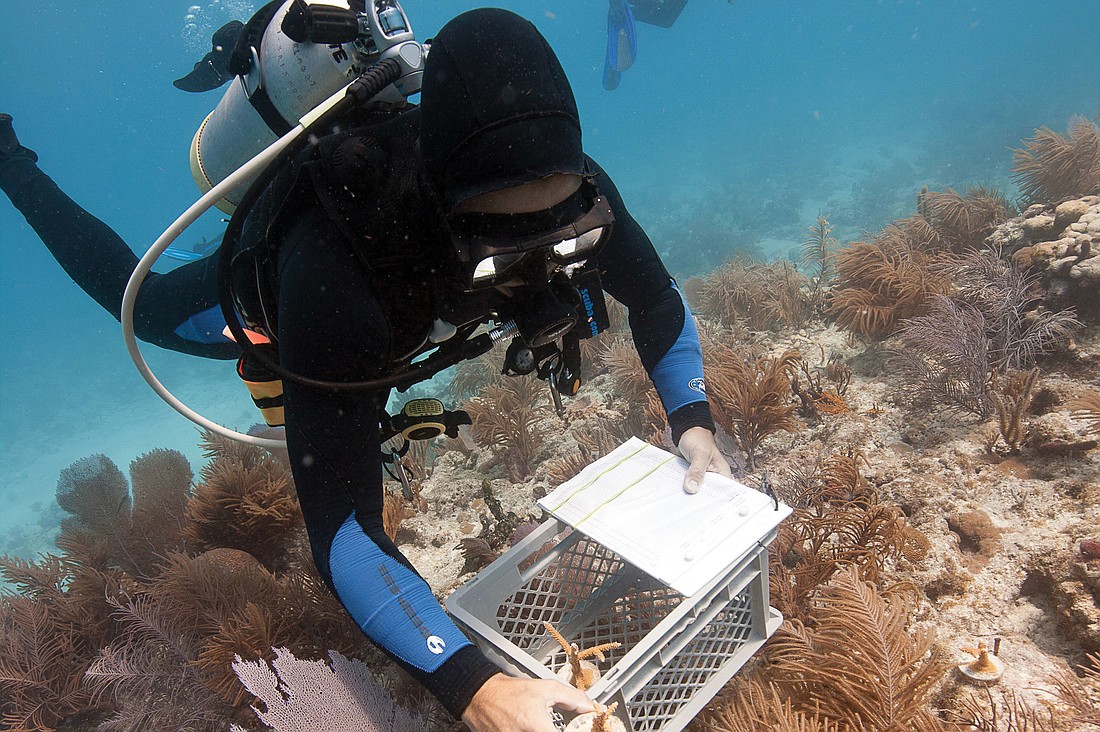- April 18, 2024
-
-
Loading

Loading

Florida has the only barrier coral reef system in the continental U.S. It’s like having the Grand Canyon underwater — a natural treasure that took millions of years to form and deserves our protection.
Why?
More than 3 million people visit Florida’s coral reef tract each year, contributing about $1.2 billion to the state’s economy. The waters surrounding Florida’s reef account for more than 20 million pounds of commercially harvested seafood each year and a vibrant sport-fishing industry.
Worldwide, coral reefs provide a home and shelter to more than 25 percent of the fish in the ocean as well as protection for another 2 million more marine species.
Coral reefs have long provided valuable pharmaceutical products and may hold clues to cures for cancer, arthritis, and human afflictions.
In 1993, Mote Marine Laboratory opened a field station in the Florida Keys to be a new base of operations for our coral reef research and restoration programs. Since then, our scientists have undertaken numerous studies on the microbiology and genetics of corals and began developing new methods and technologies to restore reefs.
Our coral reef nursery based at Summerland Key takes in damaged or displaced coral fragments, grows them in nurseries and then replants them on damaged or depleted areas of the reef tract to help jump start coral growth in those areas. In May, Mote worked with our partners, including The Nature Conservancy and the state and federal governments, to plant 10,000 coral fragments on depleted reef areas. It was the largest restoration effort of its kind in the world.
Our newest initiative is focused on one of the emerging threats to corals: the effects of ocean acidification on our ecosystem. Ocean acidification occurs when we put excess carbon dioxide in our atmosphere, causing increased acidity. The result is that animals like clams will be unable to build their shells and corals cannot build their skeletons. This could, of course, lead to the disappearance of many human food sources.
But corals don’t just live in the Florida Keys. Did you know that the Southwest Florida Continental Shelf provides suitable habitat for reef colonizers, too? Reefs closer to our part of the state are found in shallow near-shore areas and across the broad Shelf expanse out to the edge, nearly 100 miles off Florida’s coastline. And many of the species in the Florida Keys can also be found distributed among these other reef areas.
These hard bottom reefs are habitat for a diversity of species including prized fishes such as snapper and grouper. Because of the important fisheries in the Gulf, there is a very large recreational and commercial economic benefit to having a healthy reef system.
Much remains to be discovered about the Florida Gulf reefs, including their susceptibility to damage from events like hurricanes, red tide and other natural impacts in addition to impacts from things like fishing, aggregate mining and oil exploration.
Recently, the National Oceanic and Atmospheric Administration proposed listing seven species of corals in the Caribbean, Gulf of Mexico and Atlantic as endangered and two as threatened.
Sadly, corals are in decline worldwide. But research can help us understand why and what to do about it. Education and conservation efforts — like those undertaken by scientists and educators at Mote — can help reduce human impact on these precious resources.
Dr. Kumar Mahadevan, a Siesta Key resident, has been a senior scientist with Mote Marine Laboratory for more than 34 years and has served as the organization’s president and CEO for 26 years.
You Can Help
If you own a Florida-registered vehicle or trailer, you can support coral reef research and conservation by purchasing a Protect Our Reefs specialty license tag. $25 of each plate purchased supports Mote’s Protect Our Reefs Grants Program, which provides funding for research conducted by scientists here and at other Florida organizations. Learn more at reefplate.com.